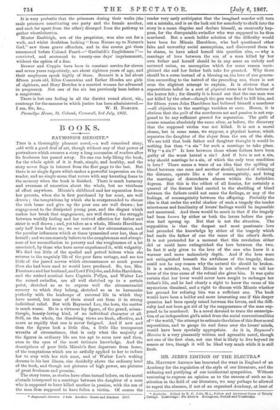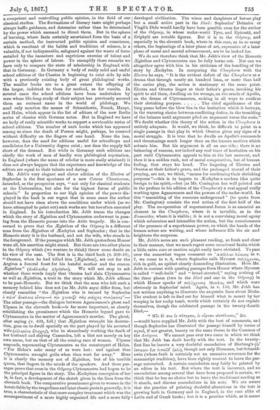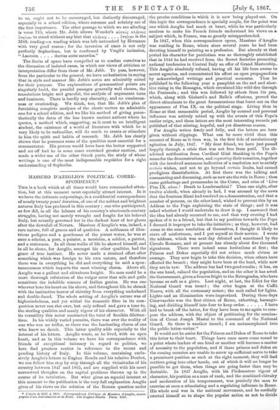MR. JEBB'S EDITION OF THE EL,ECTRA.*
Ma. Marrnsw ARNOLD has lamented the want in England of an Academy for the regulation of the style of our literature, and the widening and purifying of our intellectual sympathies. Without venturing to express an opinion as to the success of such an in- stitution in the field of our literature, we may perhaps be allowed to regret the absence, if not of an organized Academy, at least of
• Bophocles. Edited by it. C. Jebb, Fellow and Assistant-Tutor of Trinity College. Cambridge : TAe Eketra. Riringtons, Oxford and Cambridge,.
a competent and controlling public opinion, in the field of our classical studies. The fluctuations of literary taste might perhaps always baffle guidance, and determine rather than be determined by the power which assumed to direct them. But in the sphere of learning, where facts certainly ascertained form the basis of a certain method, the instructed public opinion and conscience, which is resultant of the habits and traditions of science, is a valuable, if not indispensable, safeguard against the waste of force entailed by the immature and capricious exercise of talent and power in the sphere of labour. To exemplify these remarks we have only to compare the state of scholarship in England with that in Germany. In Germany a body of really solid and useful school editions of the Classics is beginning to exist aide by side with a previously existing body of great philological works. The smaller books are to a great extent the offspring of the larger, indebted to them for method, as for results. In several cases the school editions have been undertaken by men whose life-long study of their subject has previously secured them an eminent name in the world of philology. We need only mention the names of Sehneidewin, Nau.ck, Haupt, and Halm, which appear in the list of editors of the new Berlin series of classics with German notes. But in England we have no body of really scientific works to support a serviceable series of school editions. The number of such books which has appeared among us since the death of Poison might, perhaps, be counted without difficulty on the fingers of one hand. None the less, however, does the need for editions useful for schoolboys and candidates for a University degree exist ; nor does the supply fall short of the demand. But while in Germany such editions are chiefly the work of men of hardly won philological reputation, in England (where the name of scholar is more easily attained) it does not always happen that the experience and knowledge of the editors are equal to their talents and daring.
Mr. Jebb's very elegant and clever edition of the Electra of Sophocles is the first specimen of a new Catena Classicorum, intended, as the prospectus says, " not only for classical students at the Universities, but also for the highest forms of public schools." In proportion to our high opinion of the power dis- played in the book is our regret that in some cases the author should not have risen above the conditions under which (aa we have attempted to point out) such works are but too often executed in England. In his introduction Mr. Jebb traces the changes which the story of /Egisthus and Clytemnestra underwent in pass- ing from the Homeric poems into the Attic tragedy. He is con- cerned to prove that the 2Egisthus of the Odyssey is a different man from the 2Egisthus of lEschylus and Sophocles ; that in the Homeric story it is the husband, and not the wife, who stands in the foreground. If the passages which Mr. Jebb quotes from Homer were all, his assertion might stand. But there are two other places in the Odyssey which (we venture to think) throw some doubt on his view of the case. The first is in the third book (v. 309-10), " Orestes, when he had killed him [2Egisthus], set out for the Argives a funeral feast for his hateful mother and the craven /Egisthus," (ictraitrao; Atyiehio). We will not stop to ask whether these words imply that Orestes had slain Clytemnestra as well as hlgisthus, a trait in the story which Mr. Jebb affirms to be post-Homeric. But we think that the man who left such a memory behind him does not (as Mr. Jebb says) differ from, but closely'. resembles " the ZEgisthus who is termed by Sophoeles wcivr' livcaxig OLT1,06 6I)Y 7LIYOGIV rag pcixag 11'01061.6Evog"— The other passage—the dialogue between Agamemnon's ghost and Ulysses in the eleventh book—is far more important, as clearly establishing the prominence which the Homeric legend gave to Clytemnestra in the matter of Agamemnon's murder. The ghost, after saying (v. 409, foll.) that lEgisthus wrought his destruc- tion, goes on to dwell specially on the part played by his accursed wife (olaogivn 'a'Xoxe;), wbo in shamelessly working the death of her husband and slaying Cassandra, left a blot not merely on her own name, but on that of all the coming race of women. Ulysses responds, representing Clytemnestra as the counterpart of Helen. " For Helen's sake many of us were lost : and against thee Clytemnestra wrought guile when thou wert far away." Here at is clearly the memory not of /Eg,isthus, but of his terrible queen, that lingers in the minds of the speakers. And these pas- sages prove that even in the Odyssey Clytemnestra had begun to be the principal figure in the story. The AEsehylean conception of her is, in fact, a development of the sketch given in the lines from the eleventh book. The comparative prominence given to women in the heroic fable by the tragedians and later classic poets is generally, it is true, a characteristic of that more complex treatment which was the accompaniment of a more highly organized life and a more fully
developed civilization. The wives and daughters of heroes play but a small active part in the Iliad : Sophocles' Deiauira or Virgil's Dido would hardly have been possible even for the author of the Odyssey, in whose under-world Tyro, and Epicastil, and Eriphyle are notable figures. But it is in the Odyssey, and especially in the eleventh book, where in this case, as in so many others, the beginnings of a later phase of art, expressive of a later phase of moral and mental advancement, are to be looked for.
We do not therefore think that Mr. Jebb's view of the Homeric ./Egiathus and Clytemnestra can be fully borne out. Nor can we altogether agree with him in his criticism of the handling of the story by /Eschylus. In comparing the Choephore with the Electra he says, " It is the evident defect of the Choephorse as a drama that through nearly six hundred lines, or more than half the entire play, the action is stationary at the same point.
Electra and Orestes linger at their father's grave, invoking his spirit to aid them, dwelling on his wrongs, on the oracle of Apollo, on the dream of Clytemnestra, seeking in all ways to confirm their shrinking purpose The chief significance of the long pause before the blow lies in the hesitation which it betrays, in the wavering choice between conflicting duties, in the trembling of the balance until argument piled on argument turns the scale." We doubt whether this theory of the action in the Choephorse is entirely adequate. It would, we think, be difficult to point to a single passage in that play in which Orestes gives any signs of a moral struggle. It is true that he dwells on Apollo's commands and threatenings much longer than on the human motives which actuate him. But his argument is all on one side ; there is no balancing of reasons, nor indeed any real trace of hesitation on his part until Clytemnestra appeals to him at the last moment, and then it is a sudden rush, not of moral compunction, but of human feeling, that stays his hand. The lingering of Electra and Orestes at their father's grave, and the prolonged travail of their praying, are not, we think, "means for confirming their shrinking purposes "—this is to impute to /Eichylus a modern idea quite foreign to his spirit,—but (as Mr. Conington has well pointed out in the preface to his edition of the Choephorte) a real appeal really working upon Agamemnon and the powers of the under-world. In this "assembling of the succours underground" (to quote from
Mr. Conington) consists the real action of the first half of the play. The co-operation of supernatural forces is as essential an
element in the Chttphorce, where it is invisible, as in the Eumenides, where it is visible ; it is not a convulsing moral agony which solemnizes and intensifies the action, but the consciousness of the presence of a superhuman power, on which the bands of the human actors are waiting, and whose influence fills the air and heightens the suspense.
Mr. Jebb's notes are such pleasant reading, so fresh and clear in their manner, that we much regret some occasional faults which
a little extra care or caution might easily have obviated. To pass over the somewhat•Nague comment on ' A9r6XXon, Ximtioy in v. 7, we come to v. 8, where Sophocles calls Mycenat IroXtixpueor, rich in gold, an epithet clearly demanding illustration. Here Mr. Jebb is content with quoting passages from Homer where Mycente is called " well-built" and " broad-streeted," saying nothing of the three places (two in the Iliad and one in the Odyssey) in which Homer speaks of vexlxpueoy muahm, and which were obviously in Sophocles' mind. Again, in v. 150, Mr. Jebb has
not written anything to illustrate the exquisite lines about Niobe. The student is left to find out for himself what is meant by her weeping in her rocky tomb, words which certainly do not explain themselves, though the celebrated passage in the twenty-fourth Iliad,—
" Mir ,irov iv ,virppmy, Ev orlgory olecrOXolou," &e.
—would have supplied Mr. Jebb with the best of comments, and though Sophocles has illustrated the passage himself by verses of equal, if not greater, beauty on the same theme in the Commos of the Antigone. We cannot pass over two cases in which we think that Mr. Jebb has dealt hardly with the text. In the twenty- first line he inserts a very doubtful emendation of Hartung's (IV
&traps, for igiv), though not only Hermann, but Schneid-
ewin (whose fault is certainly not an excessive reverence for the manuscript tradition), have been rightly content to leave the pas- sage untouched. A certain emendation may fairly be printed by an editor in his text. But where the text is incorrect, and no emendation among several that have been proposed is certain, we think that he has no choice but to leave the traditional reading as it stands, and discuss emendations in his note. We are aware that the practice of printing doubtful alterations in the text is growing both in Germany and in England, in the case alike of Latin and of Greek books ; but it is a practice which, as it seems
to us, ought not to be encouraged, but distinctly discouraged, especially in a school edition, where sureness and sobriety are of the first importance. The other passage to which we are alluding is verse 710, where Mr. Jebb allows Wunder's a;prok x? pons 7,,rpiXay to stand without any hint that xXiprec . . . . 75raXav is the MSS. reading—a reading which was left untouched by Hermann with very good reason ; for the inversion of cases is not only perfectly Sophoclean, but is confirmed by Virgil's imitation, " Laocoon . . . ductus sorte sacerdos."
The limits of space have compelled us to confine ourselves to the discussion of isolated cases, in which our views of criticism or interpretation differ from those of Mr. Jebb. To pass, however, from the particular to the general, we have no hesitation in saying that in style and manner Mr. Jebb's notes are admirably suited for their purpose. The explanations of grammatical points are singularly lucid, the parallel passages generally well chosen, the translations bright and graceful, the analysis of arguments terse and luminous. There is hardly any obscurity, and no cumbrous- ness or overloading. We think, too, that Mr. Jebb's plan of furnishing complete analyses of the choric metres an admirable one for a school edition, and we like his method of giving paren- thetically the dates of the less known ancient authors whom he quotes, a method which, suggesting, as it must to an intelligent student, the existence of a world of literature with which he is very likely to be unfamiliar, will do much to create or stimulate in him the spirit and habits of research. Mr. Jebb has clearly shown that he possesses some of the qualities most essential for a oommentator. His powers would have been the better supported and set off had he in some cases exercised greater caution, and made a wider use of the other Greek poets, the study of whose writings is one of the most indispensable requisites for a right understanding of Sophocles.
































 Previous page
Previous page